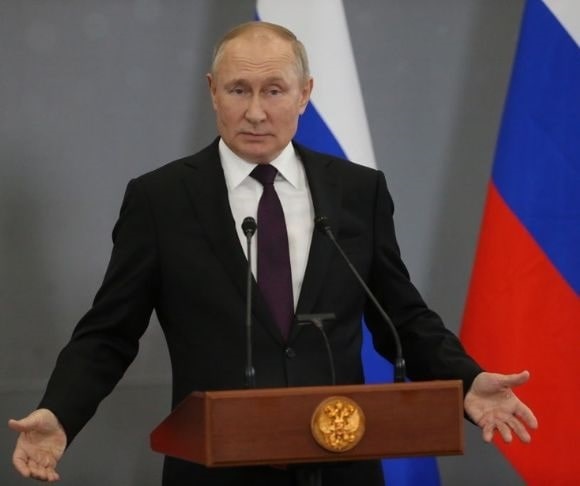For the third time in less than eight months, Russian President Vladimir Putin has brought in a new commander, General Sergei Surovikin, to lead Russian forces in Ukraine. It wasn’t that long ago, in April, Putin appointed General Aleksandr V. Dvornikov, dubbed “The Butcher of Syria,” to command the Russian army in Ukraine. Dvornikov got the name for his preference for destroying Syrian towns with persistent and devastating artillery and missile attacks. At that time, Liberty Nation explained the change of command by the Russians as the result of frustration by Putin and the Kremlin over the failure of Russian forces to make progress in meeting the “special military operation” objectives of subduing Kyiv and the Donbas Region.
 However, there were few battlefield successes, and more setbacks, for Dvornikov. So, it’s not surprising that reports soon circulated in Ukraine that Dvornikov was out and General Gennady Zhidko, the former commander of the Eastern Military District, was in charge. But Zhidko’s tenure was short. The destruction of the Crimean bridge, critical link between Crimea and Russia, on October 8, during Zhidko’s watch may have had something to do with his abbreviated tour in command.
However, there were few battlefield successes, and more setbacks, for Dvornikov. So, it’s not surprising that reports soon circulated in Ukraine that Dvornikov was out and General Gennady Zhidko, the former commander of the Eastern Military District, was in charge. But Zhidko’s tenure was short. The destruction of the Crimean bridge, critical link between Crimea and Russia, on October 8, during Zhidko’s watch may have had something to do with his abbreviated tour in command.
New “Butcher of Syria” Surovikin Takes Charge in Ukraine
The Associated Press (AP) broke the story that Coach Putin had sent in another reserve quarterback, Surovikin, whose previous command was in Syria – and he too was known as the “Butcher of Syria.” Surovikin got that name while he was destroying Syrian towns, much like Dvornikov. “Surovikin has previously led Russian forces in Syria and was accused of overseeing a brutal bombardment that destroyed much of the city of Aleppo,” Hyder Abbasi reported for the AP. Unlike his predecessors Surovikin will be in command of all Russian forces fighting in Ukraine.
Reports from Kyiv suggest the new commander was chosen to breathe life into a campaign that has been faltering for the past several months. Russian forces have suffered terrible losses and do not seem to be able to recover. The string of combat failures has generated significant discontent among the Russian people. Combine the military defeats with the recent, hugely unpopular call-up of 300,000 reserves to join the ongoing conflict, Putin had to demonstrate that he was making decisions to change the downward trajectory of the Kremlin’s battlefield fortunes. “Putin is continuing to shuffle his senior military commanders, likely to deflect blame from himself and to regenerate enthusiasm in the extremist pro-war community…The Russian pro-war, nationalist community cheered this announcement,” an Institute for the Study of War (ISW) assessment explained.
The new commanding general started his career fighting in Afghanistan against an entrenched population not unlike what he is facing in Ukraine. The difference is, of course, Kyiv’s forces are organized and increasingly equipped with modern, effective weapons. Surovikin’s combat experience includes the 1990s conflicts in Tajikistan and Chechnya, with his latest tour in a conflict zone being Syria. In an episode for which the moniker “butcher” is deserved, reports from the BBC describe the brutal treatment soldiers under Surovikin’s command meted out to civilians, including being involved with the use of sarin nerve agent in Syria. “Over 30 years or so this reputation of being ‘a brutal, very tough and unpleasant individual’ has developed,” Russian history and culture professor Peter Waldron told the BBC.
Living Up to His Reputation

General Sergei Surovikin (Photo by Sefa Karacan/Anadolu Agency/Getty Images)
Surovikin, Living up to his reputation, immediately initiated an offensive against Ukrainian cities with massive airstrikes on October 10 and 11. “The Ukrainian General Staff stated that Russian forces fired nearly 30 Kh-101 and Kh-55 cruise missiles from Tu-95 and Tu-160 strategic bombers and damaged critical infrastructure in Lviv, Vinnytsia, Dnipropetrovsk, Donetsk, and Zaporizhia oblasts,” ISW reported.
Putin’s choice of Surovikin makes sense from a continuity of effort perspective. The general is not a newcomer to the Ukraine conflict. He has been commanding troops on the front lines in southern Ukraine. However, now, for the first time, a single commander has responsibility for the entire mission, no doubt in hopes that unity of command will shore up some of the command-and-control issues that have hobbled Moscow’s forces. In any event he has his work cut out. Lower echelon unit commanders fail at essential coordination, the logistics train for Russian soldiers is “vulnerable” and inadequate, and most problematic is “collapsing morale across many units,” Tom Rogan wrote in The Washington Examiner.
The tide of the Ukraine conflict in recent months has turned in favor of Kyiv’s fighting forces with heavy military arms support from the US and NATO countries as the Russian momentum declines. It is doubtful Surovikin’s scorched-earth tactic of obliterating towns and villages full of innocent civilians amid the carnage will be successful. If it is not, and one more “butcher” fails, Putin might consider getting his next commander from the produce aisle.
The views expressed are those of the author and not of any other affiliation.




